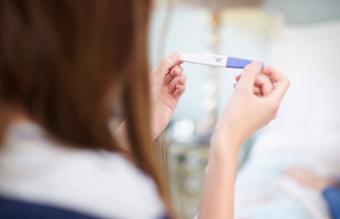
false negative pregnancy test Used under license from iStockPhoto.
There's usually a lot of excitement and anxiety involved in taking pregnancy tests, which makes false negatives so frustrating. Home pregnancy tests are very accurate early in a pregnancy, especially if you follow the instructions with care. A blood test at the doctor's office can sometimes detect a pregnancy even earlier than a home test, but false negatives are always possible.
Receiving a false negative result on a home pregnancy test means the test result stated you are not pregnant when, in fact, you are.
Pregnancy Tests and False Negatives: Possible Causes
There are many different types of home pregnancy tests, which can cause false negatives for one of several reasons:
Miscalculated Reaction Time
It is important to follow the manufacturers directions thoroughly. Some pregnancy tests, such as the digital EPT Pregnancy Test, take three minutes before the results will process fully. Other tests make take two to four minutes. You should also know that if you let the test sit for too long, the test may also produce a false result.
Detection Attempt Too Early
Home tests are designed to detect minute amounts of the pregnancy hormone human chorionic gonadotropin (hCG) in the urine. But in the first few days of pregnancy, hCG levels may be too low to give a positive result. Home pregnancy tests vary in their ability to detect small amounts of hCG in the urine and the levels rise differently in different women. It is possible you are pregnant but there is not yet a significant amount of hCG in your urine.
Erratic Technique
In order for a home pregnancy test to work properly, it is necessary to saturate the test strip thoroughly. If you did not leave the test strip in your urine stream or in the cup long enough, you may receive a false negative test result.
Old Pregnancy Test
Always check the expiration date on the home pregnancy test packaging before making your purchase. An out-of-date test kit is apt to provide inaccurate results.
Medications and Medical Conditions
Certain fertility drugs and other medications as well as rare medical conditions may skew the results of pregnancy tests. False negatives may be more common in these situations.
What To Do If You Think You Received a False Negative
Dealing with potential false negatives is one reason that it's a good idea to buy dual-pack home pregnancy test kits. A kit containing two tests only costs a few dollars more and, in the event the first test result is not what you expected, you will have a second test available. If you receive a negative test result, wait three days and take another test if your period has not started. If you receive another negative result but still believe you may be pregnant, make an appointment with your physician. It could be that you are not pregnant but are suffering from some other condition that may require medical treatment.
No one likes waiting to find out if she is pregnant. However, to get the most accurate results from a home pregnancy test, it is best to wait until you have missed a period and to follow the pregnancy test instructions thoroughly.







